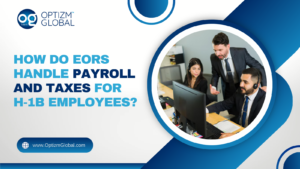Building your team overseas is a thrilling milestone—but it’s also full of choices that impact your bottom line in the long run. Perhaps the biggest question firms have about expanding abroad is:
Do we use traditional employment solutions or work with an Employer of Record (EOR)?
At first blush, traditional in-house hiring appears more straightforward. But when you include international laws, taxes, payroll systems, and HR infrastructure, the cost of doing it all yourself can quickly snowball.
In this blog, we will discuss the real cost of both methods and enable you to decide on a solution that best suits your business.
What are Traditional Employment Solutions?
This typically means creating your local legal entity in the host country and bringing on new employees via:
- Local hiring with local HR teams
- In-house payroll
- Local tax and compliance issues
- Employee benefits and terms of employment
This process grants you total control, but it requires a very expensive up-front investment of time, money and the use of appropriate legal resources.
What Are Employer of Record Services
An Employer of Record (EOR) is a third-party provider that is the legal employer for your foreign hires. You retain full control of the employee’s job and responsibilities, but the EOR takes care of:
- Local payroll and tax filing
- Employment contracts
- Benefits administration
- Compliance with local labor laws
It’s a plug-and-play staffing solution that lets you hire without establishing a local entity, saving you both time and risk.
A Clear Cost Comparison
Let’s have a look at the components:
1. Entity Set-Up & Ongoing Maintenance
Traditional Employment Solutions:
– Costs to register a legal entity (varies by country): $10,000 – $50,000
– Local business licenses and tax ID’s
– Ongoing costs associated with accounting, auditing and tax filing.
EOR Solutions:
– $0 set-up costs
– Pay as you go per employee, every month
– No legal entity costs
Winner: EOR – particularly helpful for business testing new markets or hiring a few people.
2. Payroll and Tax Compliance
Traditional:
– In-house payroll software or you need to hire a local third-party payroll provider.
– High risk of penalties if you miss filing deadlines or mis-classify employees.
– You need in-house know how or hire local HR people.
EOR:
– Payroll processing, tax filing, social contributions.
– Takes care of currency conversion and achieves full local regulatory compliance.
– Does not require internal headcount dedicated to processing payroll.
Winner: EOR – provides significant cost savings and reduces legal/policy risk.
3. Benefits & Employment Contracts
Traditional:
– Must conduct research and provide country-specific statutory benefits (e.g., pensions, maternity leave, 13th-month salary)
– Must prepare compliant local employment contracts
– Fees for legal consultation can mount up
EOR:
– Provides pre-screened, personalized, compliant employment contracts
– Manages localized benefits administration
– Typically negotiates improved benefit plans at scale
Winner: EOR — sidesteps legal issues and streamlines contract management.
4. Time to Hire
Traditional:
– Setup time: 3–12 months, depending on the jurisdiction
– Delays employment while legal structures are being established
EOR:
– Hire talent within a few days without setting up a local entity
– Ideal for time-sensitive project-based or opportunistic hires
– Winner: EOR — saves months of setup time.
5. Cost Transparency & Flexibility
Traditional:
– Hidden costs across legal, HR, and finance teams
– Long-term commitment to entity maintenance
– Expensive and hard to shut down operations
EOR:
– Fixed monthly fee per employee (typically $300–$1000)
– Transparent billing with less surprise cost
– Easy offboarding with no entity wind-down costs
Winner: EOR — provides flexible, predictable pricing.
When Is Traditional Employment a Better Fit?
Though EORs suit most companies, there are circumstances under which traditional hiring is more appropriate:
- You’re expanding a substantial local workforce (50+ staff).
- You require full control of operations or constant presence in the nation.
- You’re establishing a physical office or manufacturing base.
You’re operating in a nation where EORs lack strong legal recognition.
In those situations, the initial investment can be justified—but only if you’re in it for the long term.
When EOR Services Are the Intelligent Choice
An EOR is ideal if you:
- Are piloting a new market
- Must hire globally without delay
- Want to reduce legal risk and HR administrative burden
- Have a small team and no local HR infrastructure
- Must be cost-efficient in scaling globally
It’s particularly useful for startups, remote-first businesses, and companies hiring in 2–10 international markets.
Last Thoughts: Cost Is More Than Dollars
When weighing employer of record services against more conventional employment solutions, look beyond mere dollars—but also time, risk, compliance, and attention.
An EOR might cost more per employee in theory, but it bypasses thousands of dollars in setup fees, minimizes legal exposure, and spares you months of HR labor—so you can devote energy to growth, not forms.
Ultimately, the wisest hiring strategy is one that is consistent with your phase of development, resources, and objectives for hiring.






